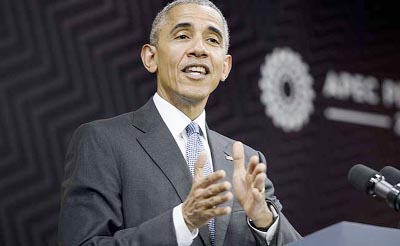
AP, Washington :
As Barack Obama began preparing to leave office, the first smartphone-toting U.S. president ordered his team to upgrade the White House’s aging technology for his successor. New computers were purchased and faster internet was installed. Not included in the modernization plans? A courier service.
But that delivery method of a bygone era may be in for a comeback under Donald Trump. Despite his voracious use of Twitter, the president-elect appears to be leaning toward old tech to ensure the security of sensitive messages.
“It’s very important, if you have something really important, write it out and have it delivered by courier, the old-fashioned way because I’ll tell you what, no computer is safe,” Trump told reporters Saturday in response to questions about Russia’s alleged hacking of Democrats during the presidential election. Trump, who doesn’t email or surf the internet, said days earlier that computers “have complicated lives very greatly.”
Trump’s skepticism of some technology marks a sharp contrast from the president he’ll replace on Jan. 20. Obama, who was a youthful 47 years old when he took office, carries a specially outfitted Blackberry, emails with a small number of friends and aides, and has received some of his daily security briefings on an iPad. He celebrated technological innovations at an annual science fair, created the job of chief technology officer in the White House and viewed technology as key to making the sprawling federal government more efficient and responsive to the public.
A much less frequent Twitter user than Trump, Obama let loose Sunday with a volley of tweets highlighting some of his accomplishments as president: boosting clean energy, bringing troops home, delivering “the longest streak of job growth in our history,” passing a law to make health care affordable, reducing dependence on foreign oil and working “to reaffirm that all are created equal.”
But technology has also been a burden for Obama. Online sign-ups for his health care law were crippled by massive technical issues, resulting in one of the most embarrassing episodes of his presidency. National Security Agency contractor Edward Snowden stole classified information that he leaked to journalists, revealing the Obama administration’s bulk collection of millions of Americans’ phone records, as well as U.S. spying on some friendly foreign leaders.
Trump, 70, rarely uses a computer and sifts through stacks of newspapers, magazines and printed articles to read the news. He panned candidates’ reliance on data and technology in presidential campaigns, preferring to make decisions in part based on the reaction from audiences at his rallies. While Trump’s tweetstorms are already legendary, he utters some of his messages out loud and leaves the actual typing to aides.
As Barack Obama began preparing to leave office, the first smartphone-toting U.S. president ordered his team to upgrade the White House’s aging technology for his successor. New computers were purchased and faster internet was installed. Not included in the modernization plans? A courier service.
But that delivery method of a bygone era may be in for a comeback under Donald Trump. Despite his voracious use of Twitter, the president-elect appears to be leaning toward old tech to ensure the security of sensitive messages.
“It’s very important, if you have something really important, write it out and have it delivered by courier, the old-fashioned way because I’ll tell you what, no computer is safe,” Trump told reporters Saturday in response to questions about Russia’s alleged hacking of Democrats during the presidential election. Trump, who doesn’t email or surf the internet, said days earlier that computers “have complicated lives very greatly.”
Trump’s skepticism of some technology marks a sharp contrast from the president he’ll replace on Jan. 20. Obama, who was a youthful 47 years old when he took office, carries a specially outfitted Blackberry, emails with a small number of friends and aides, and has received some of his daily security briefings on an iPad. He celebrated technological innovations at an annual science fair, created the job of chief technology officer in the White House and viewed technology as key to making the sprawling federal government more efficient and responsive to the public.
A much less frequent Twitter user than Trump, Obama let loose Sunday with a volley of tweets highlighting some of his accomplishments as president: boosting clean energy, bringing troops home, delivering “the longest streak of job growth in our history,” passing a law to make health care affordable, reducing dependence on foreign oil and working “to reaffirm that all are created equal.”
But technology has also been a burden for Obama. Online sign-ups for his health care law were crippled by massive technical issues, resulting in one of the most embarrassing episodes of his presidency. National Security Agency contractor Edward Snowden stole classified information that he leaked to journalists, revealing the Obama administration’s bulk collection of millions of Americans’ phone records, as well as U.S. spying on some friendly foreign leaders.
Trump, 70, rarely uses a computer and sifts through stacks of newspapers, magazines and printed articles to read the news. He panned candidates’ reliance on data and technology in presidential campaigns, preferring to make decisions in part based on the reaction from audiences at his rallies. While Trump’s tweetstorms are already legendary, he utters some of his messages out loud and leaves the actual typing to aides.

